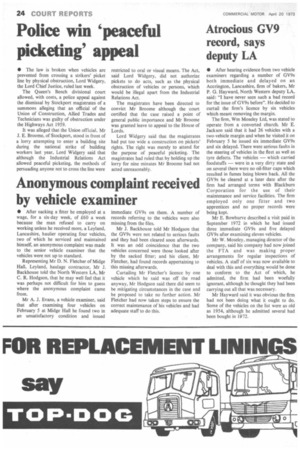Atrocious GV9 record, says deputy LA
Page 26

If you've noticed an error in this article please click here to report it so we can fix it.
• After hearing evidence from two vehicle examiners regarding a number of GV9s both immediate and delayed on an Accrington, Lancashire, firm of bakers, Mr P. G. Hayward, North Western deputy LA, said: "I have never seen such a bad record for the issue of GV9s before". He decided to curtail the firm's licence by six vehicles which meant removing the margin.
The firm, Wm Moseley Ltd, was stated to operate from a converted church. Mr E. Jackson said that it had 26 vehicles with a two-vehicle margin and when he visited it on February 5 he issued six immediate GV9s and six delayed. There were serious faults in the steering of vehicles in the fleet as well as tyre defects. The vehicles — which carried foodstuffs — were in a very dirty state and on several there were no oil-filter caps which resulted in fumes being blown back. All the GV9s he cleared at a later date after the firm had arranged terms with Blackburn Corporation for the use of their maintenance and service facilities. The firm employed only one fitter and two apprentices and no proper records were being kept.
Mr E. Bowburve described a visit paid in September 1972 in which he had issued three immediate GV9s and five delayed GV9s after examining eleven vehicles.
Mr W. Moseley, managing director of the company, said his company had now joined the FTA and was making proper arrangements for regular inspections of vehicles. A staff of six was now available to deal with this and everything would be done to conform to the Act of which, he admitted, the firm had been woefully ignorant, although he thought they had been carrying out all that was necessary.
Mr Hayward said it was obvious the firm had not been doing what it ought to do. Some of the vehicles on the list were as old as 1954, although he admitted several had been bought in 1972.




































































































